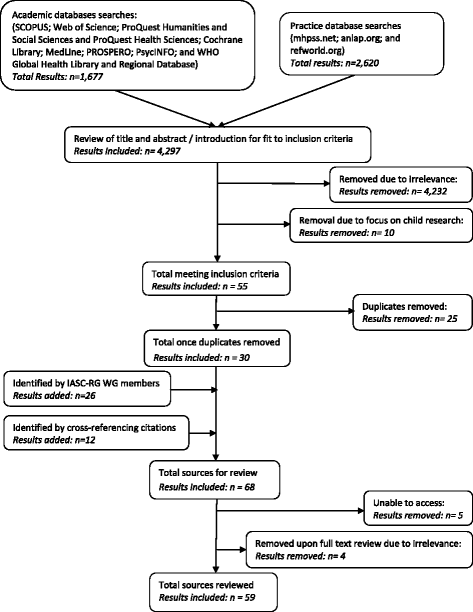Ethical standards for mental health and psychosocial support research in emergencies: review of literature and current debates
- PMID: 28178981
- PMCID: PMC5299703
- DOI: 10.1186/s12992-017-0231-y
Ethical standards for mental health and psychosocial support research in emergencies: review of literature and current debates
Erratum in
-
Erratum to: Ethical standards for mental health and psychosocial support research in emergencies: review of literature and current debates.Global Health. 2017 Jun 29;13(1):41. doi: 10.1186/s12992-017-0264-2. Global Health. 2017. PMID: 28662666 Free PMC article. No abstract available.
Abstract
Background: Research in emergencies is needed to understand the prevalence of mental health and psychosocial problems and strengthen the evidence base for interventions. All research - including operational needs assessments, programme monitoring and evaluation, and formal academic research - must be conducted ethically. While there is broad consensus on fundamental principles codified in research ethics guidelines, these do not address the ethical specificities of conducting mental health and psychosocial support (MHPSS) research with adults in emergencies. To address this gap, this paper presents a review of multidisciplinary literature to identify specific ethical principles applicable to MHPSS research in emergencies.
Discussion: Fifty-nine sources meeting the literature review inclusion criteria were analysed following a thematic synthesis approach. There was consensus on the relevance of universal ethical research principles to MHPSS research in emergencies, including norms of participant informed consent and protection; ensuring benefit arises from research participation; researcher neutrality, accountability, and safety; and the duty to ensure research is well designed and accounts for contextual factors in emergency settings. We go onto discuss unresolved issues by highlighting six current debates relating to the application of ethics in emergency settings: (1) what constitutes fair benefits?; (2) how should informed consent be operationalised?; (3) is there a role for decision making capacity assessments?; (4) how do risk management approaches impact upon the construction of ethical research?; (5) how can ethical reflection best be achieved?, and (6) are ethical review boards sufficiently representative and equipped to judge the ethical and scientific merit of emergency MHPSS research? Underlying these debates is a systemic tension between procedural ethics and ethics in practice. In summary, underpinning the literature is a desire to ensure the protection of participants exposed to emergencies and in need of evidence-based MHPSS. However, there is a lack of agreement on how to contextualise guidelines and procedures to effectively maximise the perspectives of researchers, participants and ethical review boards. This is a tension that the field must address to strengthen ethical MHPSS research in emergencies.
Keywords: Conflict; Disaster; Emergencies; Ethical practice; Mental health and psychosocial support (MHPSS); Monitoring and evaluation; Multidisciplinary literature review; Research ethics; Research guidelines.
Similar articles
-
Mental health and psychosocial support in crisis and conflict: report of the Mental Health Working Group.Prehosp Disaster Med. 2009 Jul-Aug;24 Suppl 2:s217-27. doi: 10.1017/s1049023x00021622. Prehosp Disaster Med. 2009. PMID: 19806544
-
Measuring and modelling the quality of 40 post-disaster mental health and psychosocial support programmes.PLoS One. 2018 Feb 28;13(2):e0193285. doi: 10.1371/journal.pone.0193285. eCollection 2018. PLoS One. 2018. PMID: 29489888 Free PMC article.
-
The ethical contours of research in crisis settings: five practical considerations for academic institutional review boards and researchers.Disasters. 2019 Oct;43(4):711-726. doi: 10.1111/disa.12398. Epub 2019 Aug 22. Disasters. 2019. PMID: 31435967
-
Mental health and psychosocial support programmes for adults in humanitarian emergencies: a systematic review and meta-analysis in low and middle-income countries.BMJ Glob Health. 2019 Oct 1;4(5):e001484. doi: 10.1136/bmjgh-2019-001484. eCollection 2019. BMJ Glob Health. 2019. PMID: 31646006 Free PMC article.
-
The Integration of Mental Health and Psychosocial Support and Disaster Risk Reduction: A mapping and Review.Int J Environ Res Public Health. 2020 Mar 14;17(6):1900. doi: 10.3390/ijerph17061900. Int J Environ Res Public Health. 2020. PMID: 32183382 Free PMC article. Review.
Cited by
-
What does it mean to conduct ethical research after disasters? A case study of the 3.11 disaster in Japan.Disasters. 2025 Apr;49(2):e12681. doi: 10.1111/disa.12681. Disasters. 2025. PMID: 40040296 Free PMC article.
-
No implementation without cultural adaptation: a process for culturally adapting low-intensity psychological interventions in humanitarian settings.Confl Health. 2020 Jul 14;14:46. doi: 10.1186/s13031-020-00290-0. eCollection 2020. Confl Health. 2020. PMID: 32684948 Free PMC article.
-
In-person vs mobile app facilitated life skills education to improve the mental health of internally displaced persons in Nigeria: protocol for the RESETTLE-IDPs cluster randomized hybrid type 2 effectiveness-implementation trial.BMC Health Serv Res. 2024 Oct 22;24(1):1269. doi: 10.1186/s12913-024-11762-x. BMC Health Serv Res. 2024. PMID: 39438885 Free PMC article.
-
Erratum to: Ethical standards for mental health and psychosocial support research in emergencies: review of literature and current debates.Global Health. 2017 Jun 29;13(1):41. doi: 10.1186/s12992-017-0264-2. Global Health. 2017. PMID: 28662666 Free PMC article. No abstract available.
-
Satisfaction with mental health and psycho-social support services provided to Syrians under temporary protection in Turkey, evidence from refugee health training centers.J Migr Health. 2020 Dec 10;1-2:100022. doi: 10.1016/j.jmh.2020.100022. eCollection 2020. J Migr Health. 2020. PMID: 34405173 Free PMC article.
References
-
- Hobfoll S. Resource caravans and resource caravan passageways: a new paradigm for trauma responding. Intervention. 2014;12:21–32. doi: 10.1097/WTF.0000000000000067. - DOI
-
- World Medical Association. Declaration of Helsinki: Ethical Principles for Medical Research Involving Human Subjects. WMA General Assembly; 1964: available at http://www.wma.net/en/30publications/10policies/b3/index.html.
Publication types
MeSH terms
LinkOut - more resources
Full Text Sources
Other Literature Sources
Medical
Miscellaneous


